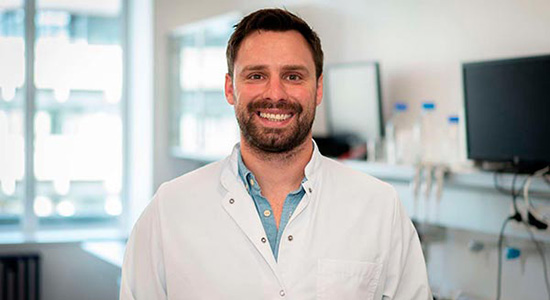Jepps Group - Vascular Biology
Over one billion people worldwide are affected by high blood pressure (hypertension). Hypertension is a major risk factor in many diseases including heart failure, stroke, chronic kidney disease, erectile dysfunction and Alzheimer's disease. Importantly, 90% of the people with hypertension are genetically prone to developing high blood pressure, but relatively little is known about the mechanisms that underlie this susceptibility.
In the Vascular Biology Group, we investigate blood vessels. We are interested in the cells that control the diameter of arteries, namely smooth muscle cells, which can contract and relax. In hypertension and atherosclerosis, hyper-contractility and restructuring of arterial smooth muscle cells leads to increased arterial tone and/or reduced blood flow. In the smooth muscle cells, several membrane proteins display altered function and expression, but without an understanding of how their membrane expression is controlled, development of new therapeutics to treat hypertension remains a distant dream.
The group's research will continue to investigate trafficking mechanisms of specific membrane proteins, such as ion channels and receptors, that are dysregulated in vascular disease.
- Wire myography on arterial segments to measure live changes in tension in response to pharmacological stimuli.
- Live calcium imaging within the arterial wall of an artery under tension (wire-myograph)
- Mass spectroscopy.
- Morpholino-induced protein knockdown in live, ex vivo arteries.
- Vascular smooth muscle cell isolation, which allows us to perform:
- Immunostaining,
- Proximity Ligation Assays,
- Electrophysiology
- Western Blotting
- Immunohistochemistry
- Electron microscopy (in collaboration with CFIM)
- In vivo, blood pressure telemetry (in collaboration with the Telemetry Unit)
We are always looking for motivated Bachelors, Masters and PhD students to join the Vascular Biology Group and work on these ongoing projects:
- The dynamic instability of the microtubule network in vascular smooth muscle
- The role of microtubule motor proteins in arteries and hypertension
- The role of microtubule-associated proteins in arteries and hypertension
- Characterise ion channels and receptors that are dependent on the microtubule network
- The impact of different vasoconstrictors on physiologically important relaxation pathways
- How do arteries change during exercise (Functional sympatholysis)?
- The effect of paracetamol metabolites on arterial reactivity
Joakim Bastrup - Postdoc
|
Samuel Baldwin – Postdoc
|
Sophie Vernimmen Olesen - Master's student
|
Pelle Munck - Master studentPelle is from Denmark and obtained his Bachelor's degree in Exercise and Sports Sciences from the University of Copenhagen in 2023. He is currently pursuing a Master's degree in Human Physiology and joined Thomas Jepps´ group in July 2024 to conduct his Master´s thesis. His Master´s thesis focuses on analyzing proteomics data from human brain autopsies and a hypertensive rat model with Alzheimer's-like pathology to uncover sex-specific differences in protein expression and disease mechanisms. Outside of the lab, Pelle enjoys exercising and playing football with friends. |
Kathrine Holm Nielsen - Master's studentKathrine comes from Denmark and completed her Bachelor's degree in Exercise and Sports Sciences at the University of Copenhagen, graduating in 2023. Her Bachelor's thesis was a systematic review on the effects of oral antibiotics in a murine model of multiple sclerosis. She is currently pursuing a Master's degree in Human Physiology, and in July 2024, she joined Thomas Jepps’ group at the University of Copenhagen to conduct her Master's thesis. Her research focuses on Alzheimer's disease, with a particular emphasis on potential sex differences in disease progression. In addition to her lab work, she enjoys weightlifting at the gym and taking long walks with her dog and friends. |
Anthony Michael Mozzicato - PhD Student
|
Jennifer van der Horst – PhD Student
|
Salomé Rognant - PhD Student
|
Thomas Jepps – Nominated for University of Copenhagen Teacher of the Year Award 2022
Jennifer van der Horst – Winner of Best Poster Presentation at the Danish Cardiovascular Academy Annual Summer Meeting 2021
Thomas Jepps – Acta Physiologica Rising Star Award 2019
Thomas Jepps – Invited to speak at the August Krogh Club “Rising Stars in Physiology” symposia 2019
Jennifer van der Horst – Winner of Best Poster Presentation at the Annual Scandinavian Vascular Research Symposium 2019
Jennifer van der Horst – Winner of Best Oral Communication at the British Pharmacological Society Main Meeting, Pharmacology 2018
Thomas Jepps – Selected to attend the 68th Lindau Nobel Laureate Meeting
2023: Sygeforsikringen “Danmark”, in collaboration with Prof. Eva Prescott. 6,321,000DKK - Early detection, characterization and treatment of microvascular disease
2023: Horizon Europe - Marie Skłodowska-Curie Actions Postdoctoral Fellowship. €214,934 awarded to Samuel Baldwin - Menstrual migraine: understanding its pathophysiology and developing precision treatment strategies.
2022: Lundbeck Foundation Experiment Grant. 2,400,000 DKK awarded to Joakim Bastrup - Mapping protein changes involved in cerebrovascular dysfunction that leads to Alzheimer's disease.
2021: Carlsberg Foundation Research Infrastructure. 547,775DKK - Visualising real-time intracellular calcium changes in the smooth muscle cells of the artery wall.
2019: Lundbeck Young Investigator Award. 10,000,000DKK - Microtubules in the vasculature – from bench to bedside.
2019: Danmarks Frie Forskningsfond. 2,313,919DKK – How do microtubules regulate vascular tone?
2017: Carlsberg Foundation, Research Fellowship. 1,178,053DKK – Microtubules in Arteries
2015: Lundbeck Foundation, travel stipend for an international laboratory stay at the University of California, Irvine, U.S.A. in Prof. Geoffrey Abbott's laboratory. 20,000DKK
2015: Lundbeck Foundation, Postdoctoral Fellowship. 700,000DKK – The role of KCNE subunits in arteries.
2014: Marie Curie Postdoctoral Fellowship, which is supported by the European Commission under the William Harvey Research Institute (WHRI)-Academy fellowship programme. €199,809 – How do KCNE subunits orchestrate arterial tone?
Group members
| Name | Title | Phone | |
|---|---|---|---|
| Amalie Grit Rejkjær Sørensen | Master Student | +4535324594 | |
| Jessica Lauren Meades | Guest Researcher | +4535325481 | |
| Joakim Armstrong Bastrup | Assistant Professor | ||
| Kathrine Holm Nielsen | Master Student | ||
| Pelle Munck | Master Student | ||
| Samuel Neil Baldwin | Postdoc Marie Curie | +4535325459 | |
| Sophie Vernimmen Olesen | Master Student |
Group Leader
Thomas Qvistgaard Jepps
Associate Professor
Phone +45 3533 0972
tjepps@sund.ku.dk

 Joakim comes from Denmark where he obtained his Master’s degree in Molecular and Medicinal Biology at Roskilde University. His master’s thesis was carried out at the pharmaceutical company H. Lundbeck A/S working on whole-brain tissue clearing techniques such as CLARITY and iDISCO. Funded by the Innovation Fund Denmark, Joakim continued as an industrial PhD fellow at H. Lundbeck A/S in collaboration with Aalborg University studying the peptidomic and proteomic complexity of amyloid plaques in Alzheimer’s disease using different imaging and mass spectrometry (MS) techniques. In July 2020, he joined Thomas Jepps’ group at University of Copenhagen as a postdoc investigating the microtubule network of vascular smooth muscle cells in hypertension using live imaging and discovery-based MS methods. In his spare time, he enjoys travelling with his wife and playing football.
Joakim comes from Denmark where he obtained his Master’s degree in Molecular and Medicinal Biology at Roskilde University. His master’s thesis was carried out at the pharmaceutical company H. Lundbeck A/S working on whole-brain tissue clearing techniques such as CLARITY and iDISCO. Funded by the Innovation Fund Denmark, Joakim continued as an industrial PhD fellow at H. Lundbeck A/S in collaboration with Aalborg University studying the peptidomic and proteomic complexity of amyloid plaques in Alzheimer’s disease using different imaging and mass spectrometry (MS) techniques. In July 2020, he joined Thomas Jepps’ group at University of Copenhagen as a postdoc investigating the microtubule network of vascular smooth muscle cells in hypertension using live imaging and discovery-based MS methods. In his spare time, he enjoys travelling with his wife and playing football.  Sam comes from Wales. He obtained his Bachelor’s degree in biomedical sciences from St George’s University, London, graduating in 2018. In his undergraduate degree Sam undertook a dissertation project investigating the expression and function of KV7 channels within mesenteric artery endothelial cells under the supervision of Professor Iain Greenwood. Funded by the British Heart Foundation, Sam continued to work in Professor Greenwood’s lab where he undertook a Ph.D. starting in 2018 investigating sexual dimorphisms in vascular KV7 function. In May 2022, Sam joined Thomas Jepps’ group at the University of Copenhagen investigating the role of aberrant lipophagy in vascular smooth muscle cells from hypertensive animals as a cause of cellular stress. Sam’s technical expertise lies mainly in wire myography, immunocytochemistry and single cell electrophysiology. Besides the lab, Sam enjoys a game of squash and a beer with friends.
Sam comes from Wales. He obtained his Bachelor’s degree in biomedical sciences from St George’s University, London, graduating in 2018. In his undergraduate degree Sam undertook a dissertation project investigating the expression and function of KV7 channels within mesenteric artery endothelial cells under the supervision of Professor Iain Greenwood. Funded by the British Heart Foundation, Sam continued to work in Professor Greenwood’s lab where he undertook a Ph.D. starting in 2018 investigating sexual dimorphisms in vascular KV7 function. In May 2022, Sam joined Thomas Jepps’ group at the University of Copenhagen investigating the role of aberrant lipophagy in vascular smooth muscle cells from hypertensive animals as a cause of cellular stress. Sam’s technical expertise lies mainly in wire myography, immunocytochemistry and single cell electrophysiology. Besides the lab, Sam enjoys a game of squash and a beer with friends. Sophie, originally from Denmark, earned her bachelor’s degree in Biomedical Laboratory Science from University College Copenhagen in 2023. Her thesis, conducted at the Laboratory of Reproductive Biology at Copenhagen University Hospital under supervision of Senior Scientist Stine Gry Kristensen, investigated the effect of antioxidant treatment on oxidative stress in xenotransplanted human ovarian tissue, using malondialdehyde as a biomarker. This work aimed to explore potential fertility preservation methods for prepubertal girls and young women undergoing gonadotoxic cancer treatments, which increase the risk of infertility. Sophie is currently pursuing a master’s degree in Human Biology at the University of Copenhagen and joined Thomas Jepps’ group in 2024. Her work will focus on the inflammatory effects of interkleukin-8 in hypertension, proteomics of the arterial secretome, and investigating the effect of colchicine treatment on arterial remodeling in rat mesenteric arteries, utilizing myography techniques. In her spare time, Sophie likes to run, swim and enjoy good food and wine with friends.
Sophie, originally from Denmark, earned her bachelor’s degree in Biomedical Laboratory Science from University College Copenhagen in 2023. Her thesis, conducted at the Laboratory of Reproductive Biology at Copenhagen University Hospital under supervision of Senior Scientist Stine Gry Kristensen, investigated the effect of antioxidant treatment on oxidative stress in xenotransplanted human ovarian tissue, using malondialdehyde as a biomarker. This work aimed to explore potential fertility preservation methods for prepubertal girls and young women undergoing gonadotoxic cancer treatments, which increase the risk of infertility. Sophie is currently pursuing a master’s degree in Human Biology at the University of Copenhagen and joined Thomas Jepps’ group in 2024. Her work will focus on the inflammatory effects of interkleukin-8 in hypertension, proteomics of the arterial secretome, and investigating the effect of colchicine treatment on arterial remodeling in rat mesenteric arteries, utilizing myography techniques. In her spare time, Sophie likes to run, swim and enjoy good food and wine with friends. Anthony comes from the USA, and moved to Denmark to pursue a Master’s degree in Human Biology at University of Copenhagen. During his thesis, Anthony utilized a mass spectrometry-based approach to identify protein secretions into the extracellular matrix of skeletal muscle, in response to exercise. In August 2020, Anthony began his PhD under the Thomas Jepps’ group, studying post-translational modifications of tubulin in mesenteric arterial vessels. He is using a combination of mass spectrometry-based techniques, paired with a physiological background, in order to study the manipulation of microtubules for investigating hypertension. When Anthony is not in the lab, he enjoys training and playing football with friends.
Anthony comes from the USA, and moved to Denmark to pursue a Master’s degree in Human Biology at University of Copenhagen. During his thesis, Anthony utilized a mass spectrometry-based approach to identify protein secretions into the extracellular matrix of skeletal muscle, in response to exercise. In August 2020, Anthony began his PhD under the Thomas Jepps’ group, studying post-translational modifications of tubulin in mesenteric arterial vessels. He is using a combination of mass spectrometry-based techniques, paired with a physiological background, in order to study the manipulation of microtubules for investigating hypertension. When Anthony is not in the lab, he enjoys training and playing football with friends. Originally from The Netherlands, Jennifer obtained her Master’s degree in Cardiovascular Research at the VU University in Amsterdam. With her interest in vascular research she accomplished her master thesis project in Thomas Jepps’ group in Copenhagen where she focused on the microtubule network in smooth muscle cells of the arterial wall, identifying a new mechanism that regulates arterial tone. In March 2019, Jennifer commenced her PhD during which she will continue to investigate this novel mechanism in the vasculature. She works with murine models and the myograph technique to investigate changes in arterial tone of isolated blood vessels. In addition to working in the lab, she is enjoying the challenge of developing a new life in Denmark, has joined an international group of friends and has discovered bouldering.
Originally from The Netherlands, Jennifer obtained her Master’s degree in Cardiovascular Research at the VU University in Amsterdam. With her interest in vascular research she accomplished her master thesis project in Thomas Jepps’ group in Copenhagen where she focused on the microtubule network in smooth muscle cells of the arterial wall, identifying a new mechanism that regulates arterial tone. In March 2019, Jennifer commenced her PhD during which she will continue to investigate this novel mechanism in the vasculature. She works with murine models and the myograph technique to investigate changes in arterial tone of isolated blood vessels. In addition to working in the lab, she is enjoying the challenge of developing a new life in Denmark, has joined an international group of friends and has discovered bouldering. Salomé comes from France where she obtained her Master’s degree in Cellular Engineering at the Poitiers University with a focus on physiology. During her first internship at the Department of Veterinary and Animal Sciences of Copenhagen University she studied the effects of compounds commonly used in equine medicine on the voltage-gated potassium channel Kv11.1. Her second internship took place in the French company Adocia where she has the opportunity to focus on developed formulation’s biocompatibility assessment. Subsequently she moved to Copenhagen to be part of Thomas Jepps’ group as a PhD Student. With her background in physiology, she is investigating the impact of the microtubules network on the electrophysiological properties of smooth muscle cell of the arterial wall. She is using the patch-clamp technic to study the different ion channels involved in arterial tone. Besides being in the lab, she loves running and art
Salomé comes from France where she obtained her Master’s degree in Cellular Engineering at the Poitiers University with a focus on physiology. During her first internship at the Department of Veterinary and Animal Sciences of Copenhagen University she studied the effects of compounds commonly used in equine medicine on the voltage-gated potassium channel Kv11.1. Her second internship took place in the French company Adocia where she has the opportunity to focus on developed formulation’s biocompatibility assessment. Subsequently she moved to Copenhagen to be part of Thomas Jepps’ group as a PhD Student. With her background in physiology, she is investigating the impact of the microtubules network on the electrophysiological properties of smooth muscle cell of the arterial wall. She is using the patch-clamp technic to study the different ion channels involved in arterial tone. Besides being in the lab, she loves running and art